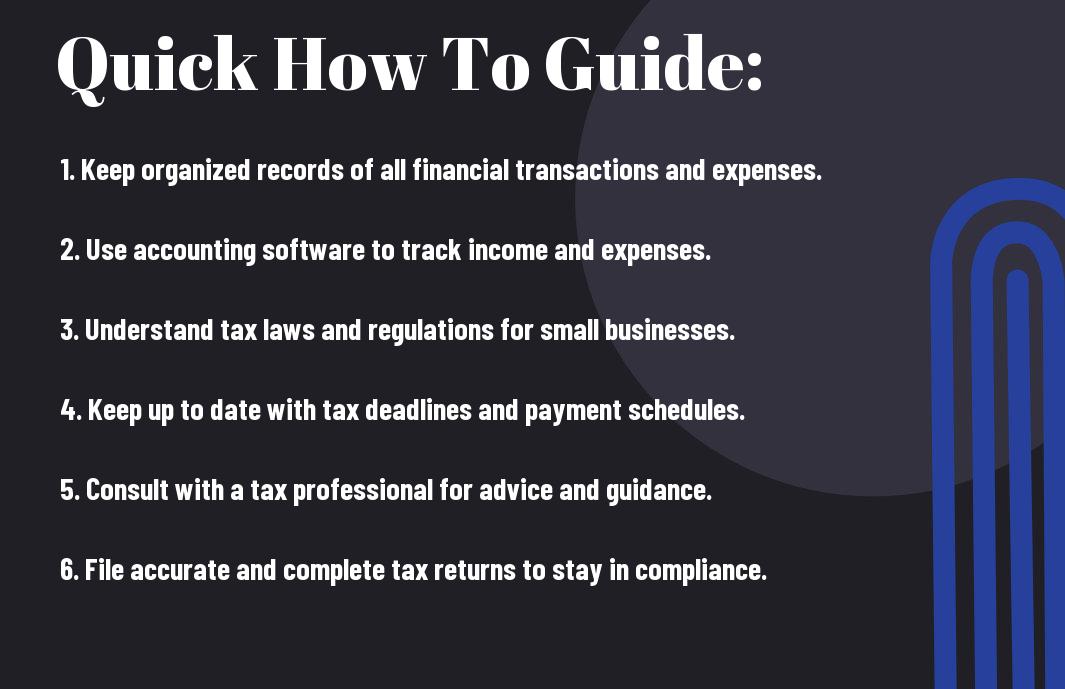How to navigate small business taxes and stay in compliance
Navigating small business taxes can be a daunting task, but it doesn’t have to be. As a small business owner, it’s crucial that you understand the ins and outs of tax laws and regulations to avoid potential penalties and audits. Staying in compliance with tax requirements is imperative for the financial health and longevity of your business, so it’s essential to take the necessary steps to ensure you are meeting all tax obligations.
In this guide, you will learn useful strategies and tips for managing your small business taxes effectively. Whether it’s understanding which tax forms to file, keeping accurate financial records, or taking advantage of tax deductions and credits, this comprehensive how-to will empower you with the knowledge and confidence to handle your small business taxes with ease. Stay informed, stay compliant, and set your business up for success.
Key Takeaways:
- Understand your federal, state, and local tax obligations – Small business owners need to be aware of the different tax requirements at the federal, state, and local levels. Keeping up with changes in tax laws and regulations is critical to staying in compliance.
- Maintain accurate financial records – Keeping detailed and accurate financial records is essential for small business tax compliance. This includes keeping track of income, expenses, and potential deductions.
- Utilize small business tax deductions and credits – Small business owners should take advantage of available tax deductions and credits to minimize their tax liability. It’s important to be aware of deductions for things like home office expenses, vehicle expenses, and business-related equipment.
- Stay organized and plan ahead – Organization is key to staying in compliance with small business taxes. Developing a system to track and organize financial documents throughout the year can make tax time less stressful. Additionally, planning ahead and knowing important tax deadlines can help avoid penalties and interest.
- Consider seeking professional help – Small business owners may benefit from seeking professional help from accountants or tax professionals to ensure compliance with small business taxes. These experts can provide guidance on complex tax issues and help maximize potential tax savings.
Establishing Your Tax Foundation
Assuming you have just started your small business or are looking to reevaluate your tax strategy, establishing a solid tax foundation is crucial. By setting up your tax framework correctly from the start, you can avoid potential issues with the Internal Revenue Service (IRS) and stay compliant with tax laws.
How to Determine Your Business Structure and Its Tax Implications
When establishing your tax foundation, one of the primary decisions you’ll need to make is selecting the right business structure. Your business structure will have significant implications for your taxes, so it’s essential to consider the pros and cons of each option. Whether you choose to operate as a sole proprietorship, partnership, S corporation, C corporation, or limited liability company (LLC), each structure has different tax implications. For example, a sole proprietorship and partnership are taxed based on the individual owner’s tax rate, while an S corporation allows for pass-through taxation. Take the time to carefully research and consult with a tax professional to determine which structure best aligns with your business goals and tax obligations.
How to Select the Correct Tax Year for Your Business
Another critical aspect of establishing your tax foundation is selecting the correct tax year for your business. The tax year you choose will determine when your business income and expenses are reported. The three main options for tax years are the calendar year, fiscal year, and a 52-53 week tax year. The tax year you select will impact when you pay taxes, how you report income and expenses, and when you need to file tax returns. Consider the nature of your business, cash flow, and any industry-specific factors when deciding on the most suitable tax year for your small business.
Tips for Obtaining an Employer Identification Number (EIN)
Obtaining an Employer Identification Number (EIN) is a crucial step in establishing your tax foundation. An EIN is a unique nine-digit number assigned by the IRS to identify your business entity. You will need an EIN if you have employees, operate as a partnership or corporation, or have a Keogh plan. To obtain an EIN, you can apply online through the IRS website or submit Form SS-4 by mail or fax. When applying for an EIN, make sure to provide accurate information about your business to avoid potential issues in the future. Once obtained, your EIN will be used for various tax purposes, including filing tax returns, making tax payments, and opening a business bank account.
- Apply for your EIN early in your business planning process to avoid delays
- Keep your EIN secure to prevent identity theft and fraudulent activities
- Ensure to update the IRS if there are any changes to your business information
This process is a fundamental step in establishing your tax foundation, so it’s essential to complete it accurately and in a timely manner.
Income Reporting Requirements
Not reporting your business income correctly can lead to serious consequences, including penalties and fines. It is important to understand the income reporting requirements for your small business to ensure compliance with tax laws.
How to Report Business Income Accurately
When reporting your business income, it is crucial to keep accurate and detailed records of all your earnings. This includes income from sales, services, and any other sources related to your business. You should also keep track of any invoices, receipts, and other documentation related to your income. This will help you accurately report your earnings and avoid any discrepancies with the IRS.
Understanding and Classifying Business Expenses
Properly understanding and classifying your business expenses is essential for accurate income reporting. You need to differentiate between different types of expenses, such as operating expenses, cost of goods sold, and capital expenses. Understanding the classification of your expenses will help you accurately report your business income and determine your net profit.
Tips for Deducting Business Expenses Properly
When it comes to deducting business expenses, it’s crucial to follow IRS guidelines to avoid any potential audits or penalties. Keep thorough records of all business expenses, including receipts and invoices. Remember to only deduct expenses that are ordinary and necessary for your business operations. Be cautious when deducting expenses related to personal use and ensure they are exclusively for business purposes. Perceiving potential red flags in your deducting practices can help you avoid any issues with the IRS.
Factors Influencing Your Tax Obligations
Keep several factors in mind when it comes to determining your tax obligations as a small business owner. These factors can greatly impact the amount of taxes you owe and the requirements you need to meet to stay in compliance. Here are some key factors to consider:
- Business structure: Whether you operate as a sole proprietor, partnership, LLC, or corporation can significantly affect your tax obligations.
- Revenue and profit: Your business’s income and profits will determine the amount of taxes you owe.
- Location: Different states and localities have varying tax rates and requirements.
- Number of employees: If you have employees, you’ll have additional tax responsibilities related to payroll and employment taxes.
Perceiving how these factors impact your tax obligations is crucial for effectively managing your small business taxes.
Understanding Self-Employment Taxes and Payments
As a self-employed individual, you’re responsible for paying self-employment taxes on your business income. This includes Social Security and Medicare taxes, which are typically withheld from employees’ paychecks. It’s important to understand how to calculate and make these payments on a regular basis to avoid penalties and interest for underpayment.
How Location Affects Your Tax Responsibilities
The location of your business can have a significant impact on your tax obligations. Different states and localities have varying tax rates, filing requirements, and regulations that can affect the amount of taxes you owe. It’s important to stay informed about the specific tax laws and policies that apply to your location to ensure you remain compliant with all tax obligations.
Tips for Managing Payroll Taxes for Employees
Managing payroll taxes for your employees is a critical aspect of running a small business. This includes withholding the correct amount of federal and state income taxes, as well as Social Security and Medicare taxes from employee paychecks. Additionally, you are responsible for contributing a matching amount of Social Security and Medicare taxes as the employer. This involves accurately calculating, withholding, and remitting these taxes to the appropriate tax agencies on a regular basis to avoid penalties and fines. This requires careful record-keeping and compliance with payroll tax laws.
- Accurate record-keeping: Keep detailed records of employee wages, tax withholdings, and employer contributions to ensure compliance with payroll tax requirements.
- Timely remittance: Make sure to remit payroll taxes to the appropriate tax agencies on time to avoid penalties and interest.
This level of compliance is essential to avoiding costly repercussions and ensuring smooth operations for your business.

Quarterly Taxes and Estimated Payments
For small business owners, understanding and managing your taxes can be a daunting task. In addition to yearly tax returns, you are also responsible for making quarterly estimated tax payments to the IRS. Failing to stay on top of these payments can result in penalties and interest, making it crucial to understand how to calculate and make these payments on time.
How-to Calculate and Make Estimated Tax Payments
Calculating and making estimated tax payments can be confusing, but it’s essential to stay in compliance with the IRS. To calculate your estimated tax payments, you will need to estimate your annual income and deductions. From there, you can use the IRS Form 1040-ES to calculate the amount of tax you are expected to owe for the year. Once you have this amount, you can divide it by four and make quarterly payments to the IRS.
It’s important to stay organized and keep detailed records of your income and expenses throughout the year to accurately calculate your estimated tax payments. Missing or underestimating these payments can lead to penalties and interest, so it’s crucial to be as accurate as possible.
The Importance of Keeping Accurate Records
Keeping accurate records of your business income and expenses is crucial for many reasons, including calculating estimated tax payments. Accurate records not only help you stay on top of your estimated tax payments, but they also provide valuable insight into the financial health of your business. When it comes time to file your yearly tax return, having detailed records will make the process much smoother and help you take advantage of all available deductions and credits.
Furthermore, maintaining accurate records demonstrates good faith in the event of an audit, and can help protect you from potential IRS penalties. Utilize accounting software or hire a professional to help you organize and maintain your records throughout the year.
Taking Advantage of Deductions and Credits
Now that you understand the basics of small business taxes and compliance, it’s time to delve into the world of deductions and credits. By taking advantage of these opportunities, you can reduce your tax liability and keep more of your hard-earned money in your business. Let’s explore how you can identify eligible tax deductions for your business and claim tax credits to boost your bottom line.
How to Identify Eligible Tax Deductions for Your Business
When it comes to identifying eligible tax deductions for your small business, it’s important to keep detailed records of all your business expenses throughout the year. This includes everything from office supplies and equipment purchases to business travel and professional fees. By staying organized and tracking these expenses, you can ensure that you don’t miss out on any potential deductions come tax time. Additionally, it’s crucial to stay updated on the latest tax laws and regulations to understand which deductions are applicable to your business and industry. By consulting with a tax professional, you can gain valuable insights into which deductions you may be eligible for and optimize your tax strategy accordingly.
How to Claim Tax Credits and Boost Your Bottom Line
Claiming tax credits is a powerful way to boost your bottom line as a small business owner. From the Research and Development Tax Credit to the Work Opportunity Tax Credit, there are numerous opportunities to offset your tax liability and maximize your savings. By leveraging these tax credits, you can reinvest the additional funds into your business, whether it’s for expansion, hiring, or innovation. To ensure you’re taking full advantage of available tax credits, it’s essential to work closely with a tax professional who can guide you through the process and help you navigate the complexities of claiming credits. By maximizing your tax credits, you can position your small business for long-term financial success and growth.
Navigating Audits and Notices
After filing your small business taxes, you may receive notices or even face the possibility of an audit from the IRS. Dealing with audits and notices can be a stressful experience, but it’s important to stay composed and follow the necessary steps to address any issues that may arise.
Tips for Responding to IRS Notices and Avoiding Penalties
When you receive a notice from the IRS, it’s crucial that you take it seriously and respond promptly. Ignoring an IRS notice can lead to penalties and interest piling up, so it’s in your best interest to address the issue as soon as possible. Here are some key tips to help you navigate IRS notices successfully:
- Read the notice carefully: Ensure that you understand the contents of the notice and the action required.
- Respond within the specified timeframe: Timely response can help prevent escalation of the issue.
- Seek professional help if necessary: If you’re unsure about how to respond, consider seeking assistance from a tax professional or accountant.
This will help you address the notice effectively and potentially avoid any further consequences.
How to Prepare for a Possible Tax Audit
While being audited by the IRS can be daunting, being prepared can help alleviate some of the stress. Here’s how you can prepare for a potential tax audit:
Organize your financial records: Having organized and thorough financial records will make the audit process smoother and demonstrate your compliance with tax laws.
Review your tax return: Before an audit occurs, thoroughly review your tax return to ensure accuracy and address any potential red flags.
By taking these steps, you can be better equipped to handle a tax audit should it arise and demonstrate that your small business is operating in accordance with tax laws.
Seeking Professional Help
When it comes to navigating the complex world of small business taxes, sometimes it’s best to seek professional help. Whether it’s a tax professional or advisor, having the expertise of someone who understands the intricacies of tax law can save you time, money, and potential headaches down the road.
When to Consult a Tax Professional or Advisor
Unlike personal taxes, small business taxes can be incredibly complex and nuanced. There are various situations when it’s beneficial to consult a tax professional or advisor. For example, if you’re starting a new business, expanding your existing business, dealing with international transactions, or facing an audit, it may be wise to seek professional help. Additionally, if you find yourself spending an excessive amount of time trying to understand tax laws and regulations, it’s probably a sign that you could benefit from the expertise of a professional.
How to Choose the Right Tax Professional for Your Business
Choosing the right tax professional for your small business is crucial to your success and compliance. When selecting a tax professional, consider their experience in working with small businesses, their understanding of your industry, and their reputation for accuracy and reliability. It’s also important to consider their qualifications, such as whether they are a Certified Public Accountant (CPA) or an Enrolled Agent (EA). The right professional should be able to provide personalized attention to your business and help you navigate the complexities of small business taxes with confidence.
Staying Updated and Compliant
Not staying updated with tax regulations and compliance requirements can lead to serious consequences for your small business. In order to avoid penalties and potential legal issues, it’s crucial to stay informed about tax law changes and develop an effective ongoing tax strategy.
How to Keep Abreast of Tax Law Changes
One of the most important aspects of staying compliant with small business taxes is to stay informed about any changes to tax laws and regulations. This can be achieved by regularly checking updates from the Internal Revenue Service (IRS) and other relevant tax authorities. Additionally, consider subscribing to tax newsletters, attending tax seminars or workshops, and consulting with a tax professional to ensure you are aware of any new regulations that may affect your business. Failure to keep up with tax law changes can result in costly mistakes and potential legal repercussions.
How-to Develop an Ongoing Tax Strategy
Developing a proactive tax strategy is crucial to ensure ongoing compliance with small business taxes. This involves maintaining accurate and up-to-date financial records, implementing effective tax planning, and meeting all required filing deadlines. You should also consider consulting with a tax professional to help you develop a tax strategy tailored to your specific business needs. Having an ongoing tax strategy in place can help you avoid unnecessary tax liabilities and ensure that you are taking advantage of any available tax benefits.

Summing Up
When it comes to navigating small business taxes and staying in compliance, it can be overwhelming trying to keep up with changing regulations and requirements. However, by following the 14 tips provided in Forbes’ article on 14 Tips To Help Business Owners Navigate Tax Season, you can ensure that your business remains in good standing with the IRS and avoids unnecessary penalties.
By keeping accurate records, staying organized, and seeking professional guidance when necessary, you can effectively manage your small business taxes and maintain compliance with little stress. With the right approach, you can navigate tax season with confidence and focus on the growth and success of your business.
FAQ
Q: What are the key tax obligations for a small business?
A: Small businesses are responsible for various tax obligations, including income taxes, payroll taxes, sales taxes, and possibly property taxes. It is essential to understand and meet these obligations to stay in compliance with tax laws.
Q: How can a small business navigate tax deductions and credits?
A: Small businesses can take advantage of various tax deductions and credits to minimize their tax liability. Common deductions include expenses related to rent, utilities, salaries, and supplies, while credits such as the Small Business Health Care Tax Credit and the Research and Development Tax Credit can provide additional savings.
Q: What are the consequences of non-compliance with small business taxes?
A: Non-compliance with small business taxes can result in severe consequences, including hefty fines, penalties, and potential legal action. It is crucial for small businesses to stay up-to-date with their tax obligations and seek professional guidance if needed to avoid costly repercussions.



